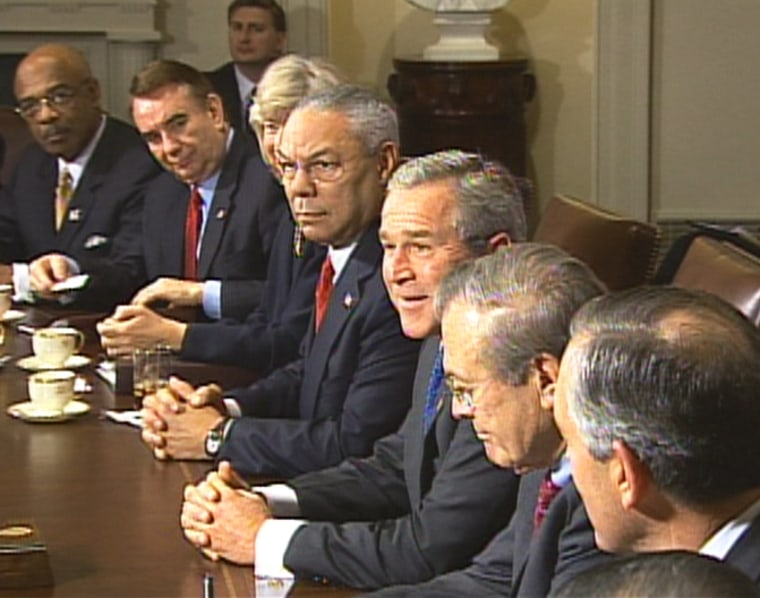A minority president no more, President Bush sketched a second-term agenda Thursday that included fighting the worldwide war on terrorism while seeking to reform taxes and Social Security.
“I earned capital in the campaign — political capital — and now I intend to spend it,” he said at a news conference 24 hours after securing his second term with 51 percent of the popular vote — a contrast to 2000, when he lost the popular vote but won the Electoral College.
“When you win, there is a feeling that the people have spoken and embraced your point of view, and that’s what I intend to tell the Congress,” he said.
Bush pledged to pursue the foreign policy that was a flashpoint in the presidential campaign and has sparked criticism by some U.S. allies in Europe.
“There is a certain attitude in the world by some that says that it’s a waste of time to try to promote free societies in parts of the world,” he said, a reference to Iraq in particular. “I’ve heard that criticism.”
“Remember, I went to London to talk about our vision of spreading freedom throughout the greater Middle East, and I fully understand that that might rankle some and be viewed by some as folly.”
No new faces, yet
On the domestic front, he said he would focus on simplifying the tax code and reforming Social Security to allow younger workers to invest some of their contributions in the stock market.
Bush sidestepped questions about potential vacancies on the Supreme Court, where Chief Justice William Rehnquist recently disclosed that he was undergoing treatment for thyroid cancer.
“There’s no vacancy for the Supreme Court, and I will deal with a vacancy when there is one,” he said.
But the president acknowledged that changes in his Cabinet and his White House staff were “inevitable.” Changes are widely expected — senior aides said Attorney General John Ashcroft was likely to submit his resignation before Bush’s inauguration for a second term Jan. 20, citing exhaustion from leading the Justice Department in fighting the domestic war on terrorism since the Sept. 11, 2001, attacks.

“People do burn out,” Bush said, adding “I haven’t made any decisions on the Cabinet yet.”
The president met Thursday with his Cabinet to discuss his most important domestic objectives and the strategies for getting them through Congress, where Republicans strengthened their hold on Election Day.
The Cabinet meeting, the first in three months, could mark the last get-together of some of the current members because it is not unusual for some to leave before or during a second term.
In addition to Ashcroft, figures mentioned as possibly leaving or changing positions include Secretary of State Colin Powell, national security adviser Condoleezza Rice, Homeland Security Secretary Tom Ridge and Health and Human Services Secretary Tommy Thompson.
After the news conference, Bush left with his family for Camp David, where they were spending a long post-election weekend.
Bush sees mandate
Bush said he was disappointed that he did not get to share his re-election with his father, former President George H.W. Bush, who left the White House just hours before Sen. John Kerry conceded Wednesday.
“I never got to see him face-to-face to watch his, I guess, pride in his tired eyes as his son got a second term,” he said.
The disputed 2000 election left Bush without a mandate, but he made it clear Wednesday that he believed he won one Tuesday, when he became the first presidential candidate since his father to win a majority of the popular vote, 51 percent.
Even before the election, aides had started work on a new budget, and the administration is preparing to ask Congress for up to $75 billion more to finance the wars in Iraq and Afghanistan and operations against terrorism. The figure indicates that the wars’ costs, particularly to battle the intensified Iraqi insurgency, are far exceeding expectations laid out early this year.
Bush has long advocated changes in Social Security to permit workers to invest part of their payroll taxes in individual retirement accounts.
Creating such accounts would be very costly — up to $2 trillion, according to some experts — but the president insisted that it was worth it to preserve the increasingly strained program.
“There are going to be costs,” he said. “But the cost of doing nothing is much greater than the cost of reforming the system today.”
Bush also wants an agreement on reforming intelligence after a report on the Sept. 11 attacks cited widespread intelligence failures. An attempt was made to complete a deal before the election, but negotiations bogged down along partisan lines.
Quest for comity
At the same time, the Democratic minority has enough seats in the Senate to block legislation by filibuster, and it will be up to the Democrats to decide how often to use that power.
Appearing confident — if not a bit tired from the grueling campaign and all-night anguish over the fate of Ohio — Bush said he would seek greater bipartisanship with members of the opposition after a first term marred by partisan battles.
“I readily concede, I’ve laid out some very difficult issues for people to deal with,” Bush said, adding that one of his disappointments with Washington “is how bitter this town can become and how divisive.”
He said he believed that there would be good will and that he had become seasoned to the capital’s ways in his first term. But he signaled some limits as to how far he would go, saying he would reach out to “everyone who shares our goals.”
The president gracefully handled one odd moment, when a reporter told Bush — incorrectly — that Palestinian leader President Yasser Arafat had died.
“My first reaction is: God bless his soul,” Bush said. “My second reaction is that we will continue to work for a free Palestinian state that’s at peace with Israel.”